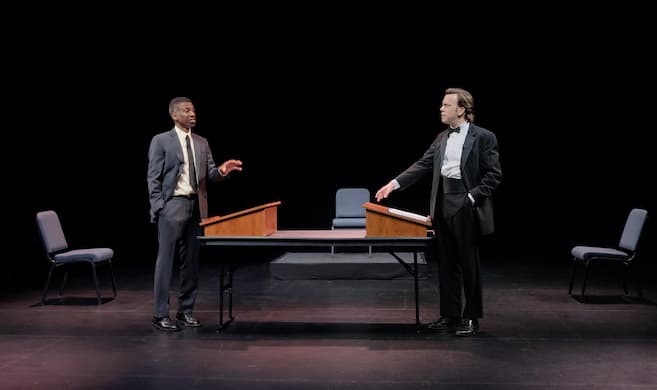Nodding Toward Baldwin as Famous Debate With Buckley Is Revived
From the start, it was Christopher McElroen’s intention that neither of his leading men impersonate their storied characters.

Two famous intellectuals meet at an elite university to debate the plight of America’s black community. One details the enduring ravages of white supremacy while the other argues that, though racism persists, both progress and personal responsibility must be taken into account.
The event could have taken place yesterday, but in fact it unfolded 57 years ago and is being documented in a new live production, “Debate: Baldwin vs. Buckley.”
The intellectuals, of course, are two of the 20th century’s most notable, James Baldwin and William F. Buckley Jr., and they crossed ideological swords across the pond, at the Cambridge Union. The motion at hand before a packed house of undergraduates — nearly all of them white and the vast majority male, as evidenced by archival footage — was: “The American dream has been achieved at the expense of the American Negro.”
Baldwin — celebrated African American novelist, essayist, poet, and civil rights activist — agreed; Buckley, the National Review founder who helped spearhead the modern conservative movement, opposed.
The 21st century crowd will surely be more diverse at the A.R.T./New York South Oxford Space in Brooklyn, where between March 5 and April 3 the american vicarious will stage “Debate” as it has been adapted and helmed by the company’s artistic director, Christopher McElroen.
Although it was first produced during the Covid shutdown in association with the media and arts organization BRIC, for a YouTube broadcast, this marks the first time Mr. McElroen’s work is being performed before a live audience. Teagle F. Bougere and Eric T. Miller reprise their respective roles as Baldwin and Buckley.
From the start, it was Mr. McElroen’s intention that neither of his leading men impersonate their storied characters.
“The approach was not to inhabit Baldwin and Buckley, but to put their words in the mouths of contemporary artists,” he says as he and the two main actors speak with the Sun via Zoom. “Because the conversation we’re having here hasn’t changed. This debate is still taking place in America, so there’s no need to pretend we’re in the Cambridge Union.”
Even the young performers who appear as student debaters supporting the distinguished visitors speak with American accents.
Mr. Bougere quips, “My wife thinks that Eric is actually better than Buckley was. But I never tried to impersonate James Baldwin — I thought that would be a trap. I’m sure his line readings and phrasings are all over my performance, but it’s not conscious; I’ve seen the debate several times. I look at it as Teagle saying James Baldwin’s words.”
Mr. Miller describes his process as “more of a melding. Buckley’s speech patterns, his elocution, his vocabulary were just so distinct. But Chris was very good about saying, ‘Let’s start with you.’ Now I find myself putting more Buckley-isms in, but Chris gave me permission to personalize it — to make sure I know what I’m saying and the logic behind it, however faulty. I can’t judge this character from Eric’s standpoint, because that wouldn’t serve the story.”
Indeed, the actors and Mr. McElroen make it no secret that they find Baldwin’s argument more convincing, to put it mildly — as did the majority of the Cambridge students.
“As Eric has pointed out many times, Buckley cherry-picks his facts,” says the director, who restored parts of Buckley’s speech that had been edited out by the BBC, presumably due to time constraints. “But he absolutely believes everything he is saying.”
Baldwin’s portion, in contrast, “is more personal,” says Mr. Bougere, noting that because Buckley closes the debate, Baldwin “doesn’t get to respond to things that Buckley says that are untrue, or out of context. A friend of mine who saw the show said, ‘Man, I wish you went last.’ But I never felt that, because what Baldwin says is so solid.”
Buckley found a more sympathetic audience when Debate was recently previewed before a gathering at the Women’s National Republican Club in Manhattan. “Boy, they loved me that night,” Mr. Miller recalls.
Another advance staging took place at the Montauk Club in Park Slope; at both performances, Mr. McElroen notes, viewers lingered afterward “to discuss and share their thoughts. I assume that will continue to be the case.”
Mr. McElroen’s longtime collaborator, Jaymes Jorsling, the american vicarious artist-in-residence who will appear in Debate as an audience member, is writing a new piece that imagines Buckley and Baldwin continuing their standoff through today. “It’s basically a ‘Waiting for Godot,’” Mr. McElroen muses. “This debate never ends, or it keeps restarting—why does that happen?”
For the director, “The most truthful thing that Buckley says is, ‘There is no instant cure for the race problem in America.’ All you can hope for with something like this is to spark dialogue, and for there to be meaning in that dialogue.”

